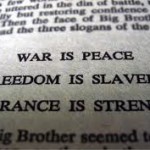OR: Don’t Shoot Brian Phillips, He’s Only the Typist
George Orwell first brought it to my conscious attention, this capacity of ours to accept violently opposite things at the same time, using the same set of brain cells. “Doublethink”, he called it. With adolescent loftiness, I had started in my early teens to notice how my reading and my family urged me to be reasonable all week, while Sunday morning church seemed to demand that I put sense in a headlock and believe a dozen dubious things before lunch. (After that, I could return to the eminent reasonableness of NFL double-headers or five hours of road hockey.) By the end of high school, I’d come to 1984, and

Language is power. The pen is mighty.
been punched by Orwell’s description of a totalitarian regime with its Thought Police and, of course, its doublethink, “the power of holding two contradictory beliefs in one’s mind simultaneously, and accepting both of them.”
Since at least those high school days, I’ve felt conflicted about my deep and dedicated love of sport. Most of the time, it just meant that I was the “flake” on the team, even when I was its best player, or that I always felt dislocated. As a “grown-up” athlete, I sometimes felt like my face in the team picture was out of focus; I didn’t share my teammates’ affection for beer or pickups (female or automotive), nor their enthusiastic ignorance of books and other flaky ponderables. “Don’t think too much, Howdy, you’ll hurt the ball-club” was at first the wise and kindly advice of an educated vet of the ball diamond, who occasionally caught me trying to understand hitting at the same time that I was doing it. (Yogi knew.) As time passed, though, in the locker room and finally in my own mind, it became a mocking sort of mantra which suggested that sport and introspection were, or maybe ought to be, mutually exclusive.
Continue Reading >>

